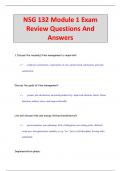NSG 132 Module 1 Exam
Review Questions And
Answers
1. Discuss the reason(s) time management is important:
✓~ - employer satisfaction, expectations of care, professional satisfaction, personal
satisfaction.
Discuss the goals of time management:
✓~ - greater job satisfaction, increased productivity, improved relations, better, future
direction, redirect stress, and improved health.
List and discuss time and energy distractions(internal):
✓~ : procrastination, poor planning, lack of delegation, not setting goals, cluttered
work area, disorganization, inability to say "no", lack of self discipline, leaving tasks
unfinished.
Implementation phase:
, ✓~ attack priorities, look for extra time, avoid procrastination, delegate when
appropriate, control interruptions, don't forget to say "no".
1. Identify three leadership styles and give examples of each:
✓~ - Authoritarian/Autocratic: leader is superior, workers are subordinates,
communication at the top, disadvantage is there is no input, advantages are snap
decision.
- Democratic/Participative: leader is a coworker, disadvantage is long time
decision making, advantage is there is creative input, 2 way communication,
motivated co-workers.
- Laissez-Faire/Non Directed: leader has no direction, workers develop their
own goals, disadvantages are multiple workers cannot make an individual
decision, advantages are freedom.
Identify situations where each leadership style would be effective:
✓~ - Authoritarian/Autocratic: emergency situations, ICU, OR.
- Democratic/Participative: charge nurse, floor nurse.
- Laissez-Faire: leaving information out for other nurses.
Identify situations where each leadership style would be ineffetive:
,- Autoritarian/Autocratic: emotional situations.
- Democratic/Participative: emergency situations.
- Laissez-Faire: emergency situations.
Functional Nursing Care:
✓~ Nurse and staff are assigned to specific tasks, assembly line.
Team Nursing:
✓~ a team of RNs and other caregivers assigned to a designated group of a patient on
a given shift. Focused more on individual care.
Total Patient Care:
✓~ Nurse provides care to a group of patients on a given shift. Expensive and lacks
continuity of care. e.g., ICU.
Primary Care Nursing:
, ✓~ A nurse is accountable for planning, evaluating, and directing the care of a patient
24/hrs q day through-out the patients stay. Comprehensive, individualized, consistent,
and expensive. e.g., Psych.
Case Management Nursing:
✓~ (modern day care) maximizing outcomes, coordinating services, follows client
through the illness, requires well educated and experienced nurses, do not provide
care.
Interdisciplinary Teams:
✓~ involves all the different groups involve in the client care, should include the
client, plan outcomes that prevent duplication of services. e.g., OT, ST, OT,
physician, nurse, and dietician all working together.
Identify the scope of practice of the RN
✓~ Comprehensive assessment, legally accountable for care received, decision
maker, holistic, broad knowledge base, supervisor of nursing practice.
Identify the scope of practice of the L.P.N




